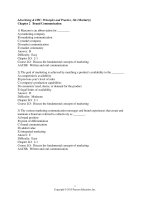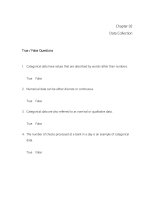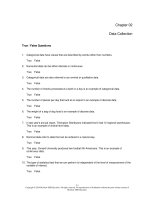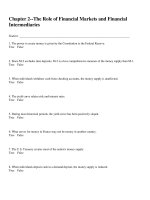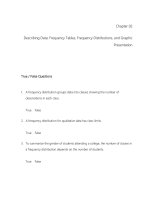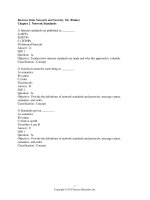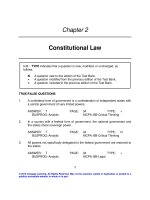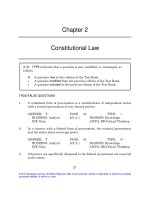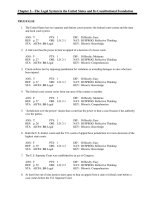Law business and society 10th edition mcadams test bank
Bạn đang xem bản rút gọn của tài liệu. Xem và tải ngay bản đầy đủ của tài liệu tại đây (238.06 KB, 35 trang )
Chapter 02
Business Ethics
True / False Questions
1. Libertarianism refers to a philosophical system that endorses an essentially free
market view of ethics.
True
False
2. Virtue ethics focuses on the classic notion of character rather than following rules.
True
False
3. Utilitarianism is the foremost branch of deontology.
True
False
4. Kant's categorical imperative is the notion that every person should act only on
those principles that he or she, as a rational person, would prescribe as universal
laws.
True
False
5. According to Carol Gilligan, women are more likely to build a morality based on
care, support, and responsiveness.
True
False
6. Formalism follows the principle of "the greatest good for the greatest number."
True
False
7. Moral identity involves the degree to which moral concerns are central to our
sense of self.
True
False
8. Organizational culture does not influence corporate misconduct.
True
False
9. In most nations, the payment of bribes is accepted as a necessary and a lawful way
of doing business.
True
False
10. The Foreign Corrupt Practices Act (FCPA) was enacted in response to disclosure of
widespread bribery by American firms.
True
False
11. The FCPA forbids "grease" payments to political parties where the purpose of the
payments is to secure the performance of a routine governmental action.
True
False
12. The passage of the Sarbanes-Oxley Act has significantly increased the importance
of corporate codes of ethics for publicly traded corporations.
True
False
13. The 2002 Sarbanes-Oxley Act significantly increased penalties and provided other
aggressive measures for attacking corporate crime by publicly traded companies.
True
False
14. Among its major provisions, the False Claims Act raises penalties to as much as 25
years imprisonment along with heavy fines.
True
False
15. Whistle blowing seems likely to increase with the passage of the 2010 Dodd-Frank
Wall Street Reform and Consumer Protection Act.
True
False
Multiple Choice Questions
16. Which of the following indicates an existentialist's belief?
A. An existentialist believes in absolute adherence to the letter of the law.
B. An existentialist believes in maximizing Christian love.
C. An existentialist believes that no actions are inherently right or wrong.
D. An existentialist believes conduct can be rationally justified.
17. Which of the following ethical theories takes essentially a free market view of
ethics?
A. Moral absolutism
B. Deontology
C. Virtue ethics
D. Libertarianism
18. Virtue ethics focuses on the classic notion that the key to good ethics lies in a
person's _____.
A. character
B. responsibilities
C. rights
D. rules
19. A(n) _____ ethical system emphasizes the consequences of an act.
A. deontological
B. teleological
C. existential
D. libertarian
20. A(n) _____ believes principle is primary and consequence is secondary or even
irrelevant.
A. deontologist
B. situationalist
C. teleologist
D. existentialist
21. A(n) _____ believes that good must be weighed against evil in reaching an ethical
decision.
A. consequentialist
B. libertarian
C. utilitarian
D. existentialist
22. Teleological ethical systems are often referred to as _____.
A. formalist ethical systems
B. existentialist ethical systems
C. deontologist ethical systems
D. consequentialist ethical systems
23. A father may be morally committed to saving his son from a burning building,
rather than saving another person who might well do more total good for society.
The action of the father would be primarily dictated by the _____ ethical system.
A. teleological
B. deontological
C. utilitarian
D. consequentialist
24. Sarah is the CEO of a company. She realizes that the only way for the company to
remain in business during the period of recession is to cut costs drastically. She
believes it would be better if all employees took a 10 percent pay cut, instead of
laying off 10 percent of the workers. She feels this is the correct decision as it
would benefit the company and all the employees. Her approach is primarily
influenced by the _____ ethical system.
A. rule-utilitarian
B. libertarian
C. deontological
D. formalist
25. Which of the following principles is most likely to be followed by a utilitarian?
A. Ethics must be measured by the rightness of rules.
B. What is right for one is right for all.
C. The greatest good for the greatest number.
D. Moral worth springs from one's decision to discharge one's duty.
26. Which of the following statements describes the formalistic view of ethics?
A. A decision that maximizes the ratio of good over evil for all those concerned is
the ethical course.
B. The rightness of an act depends little on the results of the act.
C. The moral person renders ethical decisions based on the consequences of the
decision.
D. The moral person may be forced to shun a particular act that would result in
greater immediate good.
27. Kant's categorical imperative:
A. requires one to adhere to all the rules of conduct by which society reaps the
greatest value.
B. states that one's goal is to identify the consequences of a particular act to
determine whether it is right or wrong.
C. is based on the idea that a decision that maximizes the ratio of good over evil
for all those concerned is the ethical course.
D. is the notion that every person should act on only those principles that he, as a
rational person, would prescribe as universal laws to be applied to the whole of
humankind.
28. Which of the following is identified as the post-conventional level of the six
universal stages of moral development?
A. Conform to meet the expectations of others.
B. Doing right is one's duty; obey the law and uphold social order.
C. Follow self-chosen universal ethical principles.
D. Follow rules only if it is in your own self-interest, but let others do the same.
29. Which of the following universal stages is grouped under the conventional level?
A. Adhere to stereotypical images.
B. Obey rules to avoid punishment.
C. Follow self-chosen universal ethical principles.
D. Conform to secure rewards.
30. Which of the following statements symbolizes the idea of a feminine "voice" in
view of morality?
A. Women give high priority to "rights" when making a decision.
B. Women make decisions the same way men do.
C. Women consider relationships and the needs of others.
D. Women give the highest priority to their own self-interests while making
decisions.
31. The Sarbanes-Oxley Act:
A. requires publicly traded companies to develop a code of ethics.
B. is the chief federal weapon against bribery abroad.
C. was enacted in the year 1977.
D. was enacted in response to disclosure of widespread bribery by American firms.
32. World Transit, an American firm, is establishing an African office with Mary Jones
as manager. After two months of endless efforts, Mary is informed that in order to
get utilities for their African branch, she must give some money to the
government-based electric company agent as an "encouragement," just as all the
other businesses have done. Under the Foreign Corrupt Practices Act, which of the
following statements about the payment is true?
A. The payment is illegal, since it is a bribe to a foreign government official.
B. The payment is legal, as long as all other businesses do the same thing.
C. The payment is legal, since that is the only way she can get utilities.
D. The payment is legal, since it is merely "grease" money to expedite routine
action.
33. The Foreign Corrupt Practices Act:
A. was enacted in 2002 and encourages all publicly traded companies to
voluntarily develop ethics codes.
B. does not forbid grease payments to foreign officials/political parties where the
purpose of the payments is to expedite or to secure the performance of a
routine governmental action.
C. was passed after Enron and other corporate scandals as a way to discourage
financial and accounting fraud, thus maintaining confidence in America's
financial markets.
D. defines a code of ethics as written standards that are reasonably designed to
deter wrongdoing and to promote such behaviors as honest conduct and full
disclosure in reports.
34. Which of the following is the main risk associated with the outcome of whistle
blowing?
A. Appreciation from colleagues
B. Appreciation from management
C. Undesired increase in pay
D. Fear of retribution
35. Which of the following statements is true of the False Claims Act?
A. It creates new crimes and raises penalties to as much as 25 years of
imprisonment along with heavy fines.
B. It forbids fraud in government contracts and rewards those who help to stop
fraud.
C. It requires publicly traded companies to establish internal control systems
designed to assure the accuracy of financial information.
D. It requires publicly traded companies to disclose whether they have adopted an
ethics code for senior financial management, and if not, why they have not
done so.
Essay Questions
36. Explain how religion, libertarianism and virtue ethics influence contemporary moral
analysis.
37. Differentiate between teleology and deontology. Give an example of each.
38. What is a major criticism of the Foreign Corrupt Practices Act?
39. Describe some of the factors that encourage unethical behavior in the workplace.
40. Identify the major provisions of the 2002 Sarbanes-Oxley Act.
Chapter 02 Business Ethics Answer Key
True / False Questions
1.
Libertarianism refers to a philosophical system that endorses an essentially free
(p. 66)
market view of ethics.
TRUE
Blooms: Remember
Difficulty: 1 Easy
2.
Virtue ethics focuses on the classic notion of character rather than following
(p. 66)
rules.
TRUE
Blooms: Remember
Difficulty: 1 Easy
3.
Utilitarianism is the foremost branch of deontology.
(p. 67)
FALSE
Blooms: Remember
Difficulty: 1 Easy
4.
Kant's categorical imperative is the notion that every person should act only on
(p. 67)
those principles that he or she, as a rational person, would prescribe as universal
laws.
TRUE
Blooms: Remember
Difficulty: 1 Easy
5.
According to Carol Gilligan, women are more likely to build a morality based on
(p. 74)
care, support, and responsiveness.
TRUE
Blooms: Remember
Difficulty: 1 Easy
6.
Formalism follows the principle of "the greatest good for the greatest number."
(p. 74)
FALSE
Blooms: Understand
Difficulty: 2 Medium
7.
Moral identity involves the degree to which moral concerns are central to our
(p. 75)
sense of self.
TRUE
Blooms: Remember
Difficulty: 1 Easy
8.
Organizational culture does not influence corporate misconduct.
(p. 75)
FALSE
Blooms: Remember
Difficulty: 1 Easy
9.
In most nations, the payment of bribes is accepted as a necessary and a lawful
(p. 81)
way of doing business.
TRUE
Blooms: Remember
Difficulty: 1 Easy
10.
The Foreign Corrupt Practices Act (FCPA) was enacted in response to disclosure
(p. 81)
of widespread bribery by American firms.
TRUE
Blooms: Remember
Difficulty: 1 Easy
11.
The FCPA forbids "grease" payments to political parties where the purpose of
(p. 82)
the payments is to secure the performance of a routine governmental action.
FALSE
Blooms: Understand
Difficulty: 2 Medium
12.
The passage of the Sarbanes-Oxley Act has significantly increased the
(p. 85)
importance of corporate codes of ethics for publicly traded corporations.
TRUE
Blooms: Remember
Difficulty: 1 Easy
13.
The 2002 Sarbanes-Oxley Act significantly increased penalties and provided
(p. 85)
other aggressive measures for attacking corporate crime by publicly traded
companies.
TRUE
Blooms: Remember
Difficulty: 1 Easy
14.
Among its major provisions, the False Claims Act raises penalties to as much as
(p. 87)
25 years imprisonment along with heavy fines.
FALSE
Blooms: Remember
Difficulty: 1 Easy
15.
Whistle blowing seems likely to increase with the passage of the 2010 Dodd-
(p. 87)
Frank Wall Street Reform and Consumer Protection Act.
TRUE
Blooms: Remember
Difficulty: 1 Easy
Multiple Choice Questions
16.
Which of the following indicates an existentialist's belief?
(p. 64)
A. An existentialist believes in absolute adherence to the letter of the law.
B. An existentialist believes in maximizing Christian love.
C. An existentialist believes that no actions are inherently right or wrong.
D. An existentialist believes conduct can be rationally justified.
Blooms: Understand
Difficulty: 1 Easy
17.
Which of the following ethical theories takes essentially a free market view of
(p. 66)
ethics?
A. Moral absolutism
B. Deontology
C. Virtue ethics
D. Libertarianism
Blooms: Remember
Difficulty: 1 Easy
18.
Virtue ethics focuses on the classic notion that the key to good ethics lies in a
(p. 66)
person's _____.
A. character
B. responsibilities
C. rights
D. rules
Blooms: Remember
Difficulty: 1 Easy
19.
A(n) _____ ethical system emphasizes the consequences of an act.
(p. 66)
A. deontological
B. teleological
C. existential
D. libertarian
Blooms: Remember
Difficulty: 1 Easy
20.
A(n) _____ believes principle is primary and consequence is secondary or even
(p. 66)
irrelevant.
A. deontologist
B. situationalist
C. teleologist
D. existentialist
Blooms: Remember
Difficulty: 1 Easy
21.
A(n) _____ believes that good must be weighed against evil in reaching an
(p. 67)
ethical decision.
A. consequentialist
B. libertarian
C. utilitarian
D. existentialist
Blooms: Remember
Difficulty: 1 Easy
22.
Teleological ethical systems are often referred to as _____.
(p. 66)
A. formalist ethical systems
B. existentialist ethical systems
C. deontologist ethical systems
D. consequentialist ethical systems
Blooms: Remember
Difficulty: 1 Easy
23.
A father may be morally committed to saving his son from a burning building,
(p. 67)
rather than saving another person who might well do more total good for
society. The action of the father would be primarily dictated by the _____ ethical
system.
A. teleological
B. deontological
C. utilitarian
D. consequentialist
Blooms: Apply
Difficulty: 2 Medium
24.
Sarah is the CEO of a company. She realizes that the only way for the company
(p. 67)
to remain in business during the period of recession is to cut costs drastically.
She believes it would be better if all employees took a 10 percent pay cut,
instead of laying off 10 percent of the workers. She feels this is the correct
decision as it would benefit the company and all the employees. Her approach
is primarily influenced by the _____ ethical system.
A. rule-utilitarian
B. libertarian
C. deontological
D. formalist
Blooms: Apply
Difficulty: 2 Medium
25.
Which of the following principles is most likely to be followed by a utilitarian?
(p. 67)
A. Ethics must be measured by the rightness of rules.
B. What is right for one is right for all.
C. The greatest good for the greatest number.
D. Moral worth springs from one's decision to discharge one's duty.
Blooms: Understand
Difficulty: 2 Medium
26.
Which of the following statements describes the formalistic view of ethics?
(p. 67)
A. A decision that maximizes the ratio of good over evil for all those concerned
is the ethical course.
B. The rightness of an act depends little on the results of the act.
C. The moral person renders ethical decisions based on the consequences of
the decision.
D. The moral person may be forced to shun a particular act that would result in
greater immediate good.
Blooms: Understand
Difficulty: 2 Medium
27.
Kant's categorical imperative:
(p. 67)
A. requires one to adhere to all the rules of conduct by which society reaps the
greatest value.
B. states that one's goal is to identify the consequences of a particular act to
determine whether it is right or wrong.
C. is based on the idea that a decision that maximizes the ratio of good over
evil for all those concerned is the ethical course.
D. is the notion that every person should act on only those principles that he, as
a rational person, would prescribe as universal laws to be applied to the
whole of humankind.
Blooms: Understand
Difficulty: 2 Medium
28.
Which of the following is identified as the post-conventional level of the six
(p. 74)
universal stages of moral development?
A. Conform to meet the expectations of others.
B. Doing right is one's duty; obey the law and uphold social order.
C. Follow self-chosen universal ethical principles.
D. Follow rules only if it is in your own self-interest, but let others do the same.
Blooms: Understand
Difficulty: 2 Medium
29.
Which of the following universal stages is grouped under the conventional
(p. 73)
level?
A. Adhere to stereotypical images.
B. Obey rules to avoid punishment.
C. Follow self-chosen universal ethical principles.
D. Conform to secure rewards.
Blooms: Understand
Difficulty: 2 Medium
